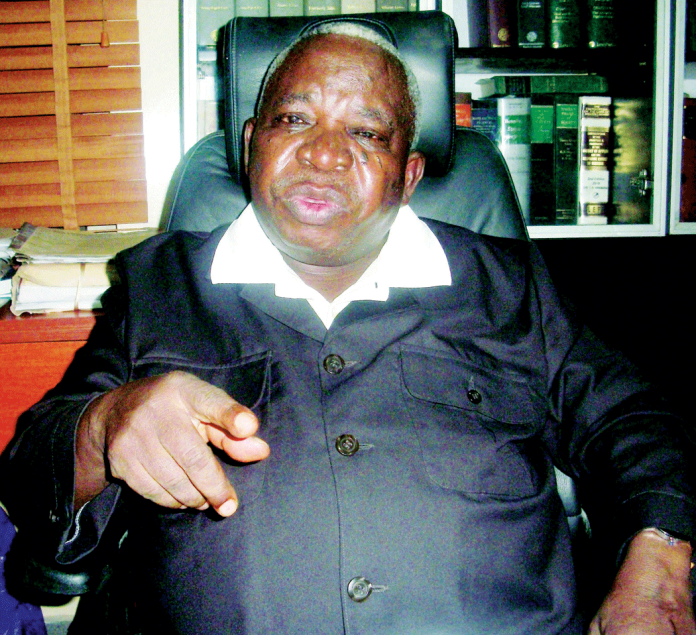At the recent All Nigeria Judges’ Conference in Abuja, President Muhammadu Buhari called for a complete reform in the judiciary to fight corruption and curb the incessant delay in justice delivery. How can this reform be carried out?
The President is stating the obvious in the sense that unless all stakeholders in the administration of justice cooperate and recognise the need to ensure that the system works efficiently, nothing will change. However, it involves many factors; the judiciary itself, the lawyers, the litigants, the executive arm of government and even the legislature. Imagine a situation where you have the Code of Conduct Tribunal (CCT) conducting trial of a member of the legislature, then you find that it is that period that the lawmakers remembered that there is a petition against the chairman of the Tribunal and they want to investigate it. Nigerians must wake up and recognise that every institution created by law must be respected and allowed to perform its duty.
The courts and the extension of the courts like the CCT are constitutionally established. To that extent, they should be allowed to carry out their functions unimpeded by anybody. We have always advocated at that level of the Nigerian Bar Association (NBA) that for the judiciary to function, it must remain independent. It must have financial autonomy and be able to direct its affairs without any interference. For example, the Chief Justice of Nigeria (CJN) does not have to go cap-in-hand either to the legislature in terms of appropriation or to the executive in terms of release of funds. So all of us have roles to play.
I agree that the appointment of judges and the condition of service are part of factors that ensure that judicial officers live above board. If you have a judicial officer whose income can barely take care of his basic needs or whose future is not readily guaranteed, you cannot be too sure you will have a judiciary that is free of corruption.
In the early 1990s in my state, I was invited to take up judicial appointment, but I declined. Why? Because I know that the salaries of judicial officers then would not be able to meet my commitments. If I went to the judiciary at that time, it is as clear as day that the temptation to be corrupt would be there. For instance, if I have to pay N50,000 as school fees and I do not have a dime and do not know where I will get it, and somebody dangles N250,000 before me, the temptation will be hard to resist.
So, the income of judges must not only be sufficient, it must be enough to take care of their needs. Also, the future of judges must be taken care off. The difference between a judge and a doctor is that for every case a judge decides, he made an enemy. It does not mean that the litigant that got favourable decision will thank him for it, but the person against whom he made a decision may not forgive him. But as a medical practitioner, if you saved a life, the person will be eternally grateful to you. So, a judge’s future must be relatively guaranteed, so that they will have the courage to do justice to all classes of people without fear or favour. However, there are people who will still be corrupt, no matter what you do for them. But such ones will not be in the majority. It is when the conditions of service are so poor that majority of them would want to fend for themselves.
Some of your colleagues have divergent views on the order of the Supreme Court, granting an application for a stay of proceedings in the trial of Senate President Bukola Saraki, who is facing trial before the CCT for false asset declaration. What is your position on the issue?
Somebody has asked me, whether the CCT was right in refusing to stay proceedings pending the interlocutory appeal before the apex court, and I said no, the tribunal was wrong. This is because if there was an application for stay of proceedings before the Supreme Court, the proper thing is for the tribunal to stay proceedings. The court may see some merit in the application. They may also see that there is need to balance the equation on both sides. So, rather than granting a stay or refusing it, they granted accelerated hearing to the entire proceedings and get the matter disposed of on its merit.
But Section 306 of the Administration of Criminal Justice Act (ACJA) 2015 prohibits stay of proceedings in criminal proceedings. Is the apex court above the law?
For instance, if the Supreme Court decides that the CCT lacks jurisdiction, whatever the tribunal did would have been a nullity. So, rather than go through the rigours of trial which will eventually be a nullity, the Supreme Court decided to give the matter accelerated hearing. The apex court did not want to give a sense of assurance to either side. If they refused the application, the appellant may be thinking that perhaps they have convicted him without hearing him or that the court is under the influence of the executive. All sorts of speculations will be on his mind. I think the decision of the Supreme Court is fair to both sides. I am not taking a position to the merit of the case; that is for the CCT to decide.
What agenda will you suggest for the new Attorney-general of the Federation (AGF), particularly as it affects administration of justice in Nigeria?
When the Vice President, Professor Yemi Osinbajo (SAN), was the Attorney-General and Commissioner for Justice in Lagos State, he did a lot of work in collaboration with the state judiciary. Courtrooms were reformed and appointment process of judicial officers was also reformed, among others. Those are the things the AGF must be thinking about. But he cannot do it alone; at least he can work in collaboration with the judiciary and make suggestions in the areas of justice administration. There are lots of laws that are not really working; laws which are archaic. He can propose amendments to these laws. I happen to know that a lot of institutions are working without regulatory laws. For instance, none of the boards of specialist hospitals in the country is operating with statute; they are operating illegally. All the federal medical centres in Nigeria do not have any statute establishing them as separate institutions. I am talking from inside knowledge and all these are things the AGF should look at.
Also in the area of administration of justice, the AGF should build effective team to defend the Federal Government in court when the need arises. If you have ever had a suit against a government institution, you find out that the defence is usually not effective. Again, when you get judgment against them, they will not obey the judgment. When we talk about the rule of law, government should set example. When judgment is given against the government or any of its agencies, they should either appeal or obey the judgment. When government uses its ‘big size’ to suppress its citizens, it is in effect sending wrong signals. Any society that is not regulated by rule of law is doomed to failure and is prone to anarchy. To ensure there is rule of law in Nigeria, the AGF has a lot of work to do.
The National Industrial Court (NIC) was established to ensure labour disputes are disposed of expeditiously. But nowadays, labour disputes linger for three to four years in court. How do you see this development?
I am very familiar with the National Industrial Court. I think there is an improvement from what it used to be and what it is now. The Third Alteration Act 2010 brought a lot of matters under the jurisdiction of the NIC. There are arguments for and against on whether this should be so. But, there is wisdom in putting them under the NIC as a constitutional court to deal with all employment matters. This was done precisely to reduce delays in labour matters in the regular courts.
Have you not heard of somebody who sued his employer over wrongful termination of his appointment and an interlocutory appeal on that case went before the Appeal Court and the Supreme Court for 14 years before coming back to the High Court. Before that time, the man would have either died or critically impoverished. I think there is wisdom in putting labour-related matters under the NIC. What the court is doing is to get more judges. The NIC is trying and the President, Justice Babatunde Adejumo, has done a lot of work in that area. Today, there is NIC in about 20 states and there is hardly a judge that does not have between 200 and 300 cases.
Could the decision of the court be appealed against at the Supreme Court?
The NIC is a specialised court and there is a concept that labour and industrial disputes should not last too long in court, if judgment obtained in that regard would be of any value.















